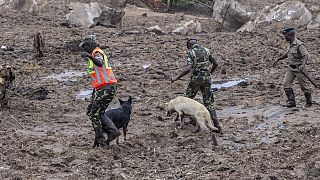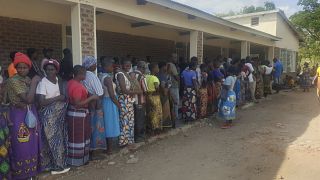Malawi
Cyclone Freddy, an exceptionally long-lasting storm, has claimed the lives of over 400 individuals in southern Africa.
The vast majority of these casualties occurred in Malawi, where the death toll continued to rise on Thursday night. As search and rescue efforts become increasingly futile, hopes of finding survivors dwindle.
Freddy struck twice in a few weeks in the region, killing 73 people in Mozambique, 17 in Madagascar, and now 326 in Malawi, according to the latest death toll announced in the evening by the president of this poor country.
"The death toll from this disaster has risen from 225 to 326, the number of displaced people has more than doubled" exceeding 183,000 in Malawi, said Lazarus Chakwera, on a trip to Blantyre (south), the economic capital and epicenter of the storms.
More than 300 emergency shelters have been opened.
Formed in early February off the coast of Australia, the cyclone, which is on its way to being classified as the longest ever recorded, made an unprecedented crossing of more than 8,000 km from east to west in the Indian Ocean.
It made landfall for the first time on the east coast of Madagascar on 21 February, killing seven people. The phenomenon, which has been raging for more than 35 days, then hit Mozambique, killing 10 people.
It then turned around and hit Madagascar a second time in early March, killing another 10 people. It also moved on to Mozambique, where it killed another 63 people.
- Buried in the mud -
But it was in Malawi, a landlocked country that had only felt an increase in rainfall when the cyclone first hit, that Freddy wreaked the most havoc upon its return. The heavy rains caused flooding and landslides.
A state of disaster and two weeks of national mourning were declared, and the police and army were deployed.
"The cyclone has destroyed property, homes, crops and infrastructure, including bridges, isolating communities in desperate need of assistance," said President Chakwera, who reiterated his call for help. The day before, the head of state had appealed for international assistance in the face of a "national tragedy".
In neighbouring Mozambique, President Filipe Nyusi, who visited the worst affected province of Zambezia (center), bordering Malawi, on Wednesday, also called for an "emergency" mobilization to "repair the destroyed infrastructure".
On Thursday, in the township of Manje near Blantyre, neighbors and rescue workers continued to search the earth in the hope of finding survivors. But rescues are increasingly resulting in a macabre collection of decomposing bodies.
Hundreds of dead are buried there, in the mud, assured the AFP of the inhabitants. The putrid smell and the air bubbles rising to the surface of the waterlogged ground leave little doubt.
- Warmer oceans -
On a sticky, rock-strewn path, grim-faced men murmur prayers as they lead the way for a team of five soldiers engaged in the search operation. In front of a dilapidated house, they pull a body, a man, from the ground. His still-readable face retained an expression of anguish.
"I hope they find more bodies so they can be buried and rest in peace," says Rose Phiri, an elderly woman from the area.
In the midst of the desolation, miracles sometimes happen: the day before, rescue workers saved 13-year-old Promise. She had been trapped in a collapsed house for three days.
Freddy began to dissipate, according to Randall Cerveny, reporter at the World Meteorological Organization (WMO), who described to AFP a phenomenon "incredibly long".
According to specialists, the warming of the oceans contributes to the intensification of cyclones. And "Freddy has intensified rapidly seven times during its existence," noted Roxy Mathew Koll, climatologist at the Indian Institute of Tropical Meteorology.
Tropical storms and cyclones occur several times a year in the southwest Indian Ocean. The latest report from the Intergovernmental Panel on Climate Change (IPCC) predicts an increase in the frequency of powerful tropical cyclones.












Go to video
AI videos falsely show Kenyan President resigning following deadly protests
01:30
Top South African official accuses police minister of colluding with crime syndicates
Go to video
Museveni to run again as Uganda's ruling party picks him for 2026 election
Go to video
US deports eight men to South Sudan after legal battle
Go to video
Tanzania’s Prime Minister steps down ahead of elections
01:00
Pix of the Day: July 3, 2025